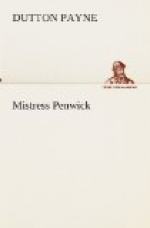She would not engage in any game, but played upon the harpsichord and sung some of her sweetest songs; Lord Cedric ever coming to her side to turn her music or offer some little service. He was aflame with hope, for had she not called him “Cedric”?
How dear it sounded; if he might only hear her say it again. He came to her side and whispered,—
“’Twas sweet of thee to call me Cedric!”—His hand for a moment rested upon the violets at her shoulder,—“Kate, why didst thou not wear the opal shoulder-knot instead of these violets?”
“Because—I value it more than aught else, and I would not wear it on all occasions, for ’twas thy mother’s choicest brooch.”
“Indeed, I love it, also, Kate, for the same reason; but I would rather see thee wear it, for I love thee, Kate, thee, thee, thee.” His voice was like a sob stirring her to a pity that made her sick and weak, and she turned from him hastily and began singing softly,—
“When love with unconfined wings
hovers within my gates;
And my divine Althea brings to whisper
at the grates;
When I lie tangled in her hair and fetter’d
to her eye;
The gods that wanton in the air, know
no such liberty.
“’Stone walls do not a prison
make, nor iron bars a cage;
Minds innocent and quiet take that for
an hermitage;
If I have freedom in my love, and in my
soul am free;
Angels alone that soar above enjoy such
liberty!’”
“Thou dost sing the words of the beautiful and amiable Richard Lovelace; I have heard my father speak of him with great affection. The lines to Althea—his sweetheart—were written in prison. She thought him dead and married some one else. He loved her more than life,—dost believe in such love, Kate?”
“Aye, why not?—Ah, Sir Julian, hast finished,—who was victor?”
“I am modest, my Lady.”
“But never too modest to hold thine own.” As she spoke thus to Sir Julian, the sands of the hour-glass ran out and nine tolled from the Chapel belfry. Before the bell had ceased, Constance had drawn Cedric and Julian into a game of cards, she placing herself opposite the window, and Katherine had stepped into an adjoining passage, and taking up her camelot cloak, with flying feet and beating heart hastened to the postern-door and slipped bolts and bars and stood without in the calm, warm night.
CHAPTER XIV
SERMONS NEW AND OLD
“The reign of Charles the Second seemed to be impregnated with a free and easy moral atmosphere that engendered lewdness in human product. It is said by a great historian that Thomas Hobbes had, in language more precise and luminous than has ever been employed by any other metaphysical writer, maintained that the will of the prince was the standard of right and wrong, and that every subject ought to be ready to profess Popery, Mahometanism, or Paganism, at the




